Mark Lucich was a fourth-round draft pick of the San Francisco Giants in 1970, after he graduated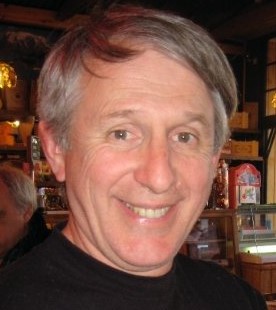 from Eureka High School in California. He chose to go to Stanford on an academic scholarship instead, and he was not drafted again, despite being All-Pac-8 his senior season.
from Eureka High School in California. He chose to go to Stanford on an academic scholarship instead, and he was not drafted again, despite being All-Pac-8 his senior season.
“Luke” is one of four players (with Barry Moss, George McPherson, and John Harrison) who played for the 1974 Eugene Emeralds when they were an independent club. Those players were retained by the Cincinnati Reds when Eugene became a Reds affiliate in 1975.
Mark Lucich George, myself, Barry Moss, and John Harrison were part of the 1974 Eugene team —
Jim Haught That was an independent team, right?
L That was an independent team, the same time as the Portland [Mavericks] team. So we beat 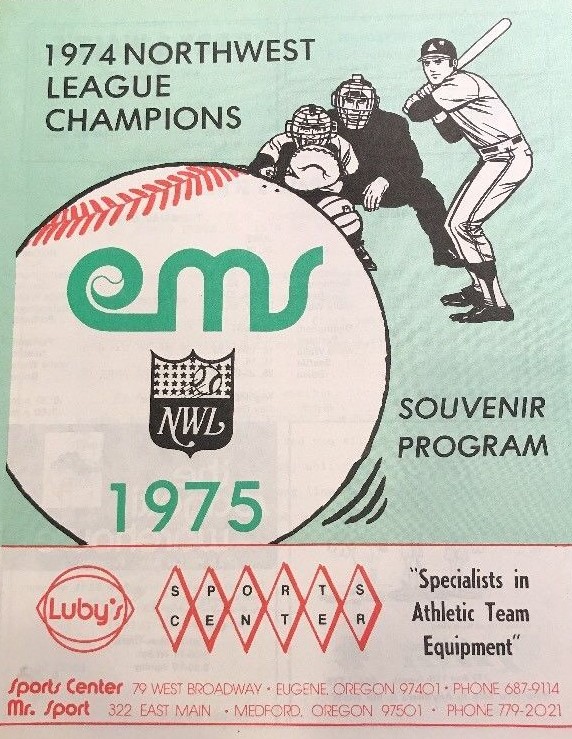 the Portland team — pissed them off. Those guys were jerks. So we’re not competing with them. And when Eugene associated with Cincinnati, like I told Greg Riddoch, I never got my head around the whole notion of the Red Emeralds. But anyway — [laughs]
the Portland team — pissed them off. Those guys were jerks. So we’re not competing with them. And when Eugene associated with Cincinnati, like I told Greg Riddoch, I never got my head around the whole notion of the Red Emeralds. But anyway — [laughs]
JH Well, there’s that LA Lakers or Utah Jazz thing.
L Yeah, that would be a perfect example. Utah Jazz? Give me a break, here.
JH I was just double-checking here. You’re 23 your first year with Eugene. You had finished college?
L Yeah! I wasn’t drafted out of college, so I came to Eugene. I made $300 that first month. So there was five of us in an apartment: two in each bedroom and one on the sofa, so we could afford to pay rent. We liked road trips, because we got some additional meal money. We were scraping by.
JH You actually were drafted by the Giants, right out of high school?
L I was drafted by the Giants out of high school. So the scout that came to talk to me in Eureka [Eddie Montague] is the same scout that signed Willie Mays. So he tells me in the living room, with my parents there, he didn’t like the swing. He doesn’t know why they drafted me. What they offered was, you know, the $10,000 for college.
JH Why did you come by my house?
L Yeah. This was stupid, you know. But for me, it’s an example, I’ve learned over the years that baseball has some of the lousiest business practices out there.
JH Yeah. I mean, you’re a fourth-round pick and they tell you that? You’d think you’d get treated a little better than that. It’s not like you’re Griffey getting drafted in the 29th round, or whatever.
L Right.
JH Well, maybe there’s a reason why, sorry to say, the Giants stunk for a lot of years, too.
L There’s a lot of organizations that stink because they are bad organizations. People don’t understand that. The business end of things, it’s just awful.
JH It’s funny to me how many ex-players will tell me things like, one of the jobs they wished they could have gotten was not necessarily to be a field manager, but to be somebody like a minor-league coordinator or somebody in player development, because they felt like they could have a lot bigger impact on how the whole organization did things that way.
Managing on the field was great, but if you’ve got a lousy chain of command, then you’ve really got problems. And some of my friends have gotten the ax for – bounce around different organizations — because on a whim, they changed farm directors and they cleaned house, and you’re just gone.
L You’re just gone, because you’re not one of the new guys’ —
JH You’re not one of his boys –
L You’re not one of his boys, so you’re gone.
Mark played football, basketball, and baseball at Eureka, but his college scholarship was academic, not athletic.
JH So you went to Stanford? Wish I could’ve gone there.
L I wasn’t recruited by Stanford.
JH You walked on?
L I walked on. I thought about it, and I’ve come to realize I was voted in here [Eureka HS Hall of Fame] last fall — and it doesn’t mean anything to me, because I played all team sports — to their Hall of Fame. They’re doing it because they never had one before, so they’re going back and kind of catching up on some players.
I played all the sports, so that means I never really excelled in any one of them. But I got known because of our American Legion coach. At 13, my Babe Ruth coach was a 26-year- old ex-Marine. Knew not that much about baseball, but we had a disciplined team.
JH There’s a shock! [laughter]
L Surprise, surprise! But he taught me to throw, because I didn’t know how to throw properly, being a first-baseman in Little League and then — all I had to do is throw from first to home. That’s most of your throws. And he followed me to Legion ball. He took over the Legion program when I was 16.
And he had this theory that — he went all over and around California and Oregon, and found us the best competition he could find — and didn’t care if we won or lost. So at that point in time, we actually had a — really quite a good team.
And that 1967 team won the State of California Legion championships, and we beat the Roy Smalley Jr. team out of LA. We beat a team out of the Bay Area. There’s a lot of major-leaguers that were in that tournament. Future major-leaguers. But we won. We started that tournament off with a triple play in the first inning.
JH That’s pretty good!
L Triple play. First, a line shot to the shortstop; had to reach. Flipped it to the second-baseman; flipped it to me for the triple play. So it was like something —
JH Something was in the air that day!
L Something in that tournament. But we had two days off in the tournament there, because they run a very, very strange tournament there, because it’s at the retired military home. So you have all of these veterans there.
So you had a great crowd, knowledgeable crowd, and they love this because at that point in time, American Legion ball was big throughout the state. And they would see all kinds of future major-leaguers.
But we had two days off. So the first day off, our coach — we played poker the whole night with our coach. He said, just take it off, relax, chill. If it wasn’t the exposure that all of us got from him putting us out and playing teams and excelling, out of high school —
I mean Eureka, here was a high-school season: We played 10 games, because there was six teams in our conference: doubleheaders, five weekends, that was our season. So if it wasn’t for summer baseball … and it was all little towns in Northern California. And I’m talking about Northern California is north of Santa Rosa. It’s nothing up there.
I had no appreciation what competition was like, what you see in the South or places where there’s a lot of ball going on. Especially the South is particularly big for baseball because it’s got the good weather — extended good weather.
I can remember [ex-big-league catcher] Hobie Landrith came up for Little League, or for some kind of demo, and he comes up there and says, you guys up here should never go without long-sleeve shirts on. It’s just too cold up here. We never understood. Wasn’t until I got back on the East Coast, I go, I understand being loose now. You know, when it’s 80 out and 80-percent humidity, oh, you’re loosey-goosey. Your muscles are loose on the West Coast. Because Eureka was known for fog. It would come in at five o’clock. Night games? Damn cold. It’s like the Mark Twain quote.
JH The coldest winter I ever spent was a summer in San Francisco.
L Yeah.
JH First time I went to Candlestick, oh my God! What an eye-opener that was!
L Candlestick was worse, because it was right next to the Bay. That damp cold is just penetrating.
Yeah, so it wasn’t conducive to baseball, but I’d gotten enough exposure so they knew who I was when I went to Stanford, but they didn’t recruit me. But I had an academic scholarship, so I didn’t cost them anything.
But I also didn’t — our coach at that point was a former pitcher, and he wasn’t that good. He spanned two Hall of Fame coaches: Dutch Farron, who ended in 1969 and then, in 1970 Ray Young started, and Ray Young went till 1976 and then Mark Marquess took over. And Marquess is — he’ll be in the Hall of Fame, if he isn’t already.
And we came in second to USC every year. We could beat — and we beat SC typically, I think, in the head-to-head battles.
But we lose a game here to UCLA. We lose a game to Cal, and USC wouldn’t lose to anybody else — and only one team went.
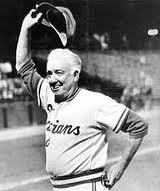
JH You’ve got USC, and I guess Rod Dedeaux in those days. A pretty tough bunch to go up against.
L And I was the first-baseman. In the old [USC] park, my first year as a freshman, they had the bench for the bullpen maybe 25 feet away, and they had the most abrasive bullpen. And you know, you can’t acknowledge it; you can hear them, and they’re just on you the whole time.
I came home after that series, and I just was [frustrated] cause you can’t answer them. You can’t answer them. There’s nothing you can do. I mean, that would only make it worse, right? But you hear it.
And Dave Kingman, that was his last year at USC.
I think we got one out of the three games down there at that time. So it wasn’t all that good, but —
JH Well, but it’s understandable. I mean, good grief.
L Yeah. You know, finally they moved into the new Dedeaux Field, and then things didn’t matter as much, because the bullpens were much farther away.
JH They were more civilized?
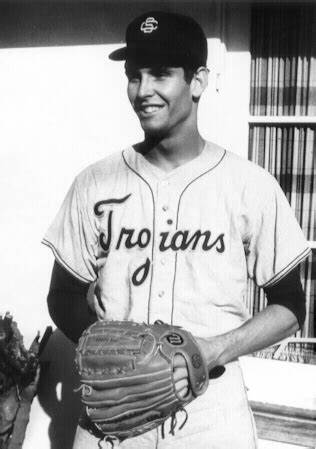
L They were more civilized. When Kingman was in that field, the right-field fence was like 30 feet tall. It was like a reverse Fenway: very short. Kingman would hit popups that would go out.
JH Oh yeah. Oh yeah. He could hit the ball a mile in the air and you’d swear it would never make it, and it would just carry just enough — it was like somebody hitting a wedge. It would go way up and just — man! It wasn’t like — the ones I saw, it wasn’t like he was going to hit them 500 feet. He hit them 375 feet, but they’d be a hundred feet in the air. Just something in the Moon somewhere. That’s a strong man.
L Exactly.
JH So did you start all four years at Stanford, or play all four years, at least?
L Yeah.
According to Baseball Cube, Mark hit .304 lifetime at Stanford, with 23 home runs and 133 runs batted in. However …
JH But you were not drafted after that? Did you go through the tryout-camp route, or how were you signed?
L I basically talked to Marquess, and he suggested he had heard there was a tryout in Eugene for the team up there. So I went up there, flew up, found a hotel room downtown, showed up for the tryouts, and made the team. They just needed people.
JH So you had a year of independent ball. But what happens when you’re done with that year? After that, as an independent player, does everybody just go their separate ways, or –
L [Nods affirmatively] Uh-humm.
JH But there was no winter ball or anything?
L There’s nothing. Nothing.
JH What are you feeling after this — this first year? I mean, you had a pretty good season. [.264/3/35, and the Emeralds won the league title.]
L I don’t remember when the Eugene team contacted us and let us know that we were — that they had affiliated with Cincinnati. And then we were picked up by Cincinnati and went to spring training. Oh, well this is great. Perfect!
So I went to spring training. They started George McPherson and myself, and I think Barry Moss; basically cause we were older, they put us in AAA. We didn’t fit their normal pattern of things.
JH Yeah. You know, 20-, 22-, 23-year-olds —
L And George [McPherson] and I went to college.
JH And the “college boy” thing — there’s going to be two schools of thought: is the college guy — should he be able to start in at least AA, because he’s played four years? Or here’s the rookie-league kid who’s fresh out of high school. We’ll put him in short-season and let him get his feet wet, that kind of thing.
L Right.
JH So they sent you to AAA?
L Well, they started us off in spring training in AAA. But by the end of the spring training, they moved us back down and sent us back to Eugene.
JH And you hit .303, 12 home runs. 61 driven in. What jumps out at me is 76 walks. I mean, that’s a lot of walks for 78 games.
L Well, they wouldn’t want to pitch to me.
JH But you must have had a pretty good eye to have that many walks, but still pop 12 out of the park. You know, and drive in 61. Oh by the way, almost an RBI a game for somebody who’s — I’m sure maybe you were a little older than the average for that league, but still –
L Well, I’d already faced better pitching.
JH So you didn’t feel like the pitching in the Northwest League was as good as college pitching? Is that because they were younger?
L Yeah. You know, once you’re a bit experienced — I’ll watch like the Houston playoff game; I’m going — and [Emeralds teammate] Tommy Watkins and I were talking about it: we would never throw Jose Altuve a fastball. Why would anybody throw him a fastball? I wouldn’t throw him a fastball, period. What I have seen of him, there’s no reason — until he can show me he can’t hit the fastball. I’m not gonna worry about it. It’s the reverse of what pitchers should be doing. If you can’t hit a fastball, I’m not gonna throw him anything else.
JH Right. Prove to me you can do it.
L Prove to me that you can do it.
He hit a homer in Eugene – a rising line drive that went over the scoreboard in right-center! Like it was shot from a cannon! I don’t know if they ever found the ball. He was so strong! And a graceful, adept first-baseman, too! — teammate John Harrison
JH So you were you were advanced for that [Northwest] league. Is that a fair statement?
L Yeah, I was probably too advanced for that league. But again, I’m at that point — you have to realize who’s in the organization. Dan Driessen was in the majors. Dave Revering was in AAA.
JH So you’re kind of blocked, anyway.
L I’m blocked anyway. But see, that was part of it. I’ve come to appreciate that was part of the genius of the Reds organization. The Reds organization, at that time, developed talent. And you’re kind of going, well yeah, that’s what they’re supposed to do, right? No, that’s not what a lot of them do.
So the next year [1976] I’m in Three Rivers [AA]. So we played the Yankees’ farm team. And they had all these guys stacked up at AA, because the AAA team was stacked up. They wouldn’t develop their players; they just trade for the big-name players at the top level. So where are these guys going? They weren’t going anywhere.
My roommate was Lynn Jones, who played with us in Eugene, and his brother Daryl was on the Yankees team, so I got to know him a little bit as a result of Lynn. And he’s Lynn’s older brother, and he was just stuck; and you’re kind of going, okay, you know? So it was eye-opening as to what goes on.
And then they replaced me in AA with Harry Spilman. They were loaded with young, talented 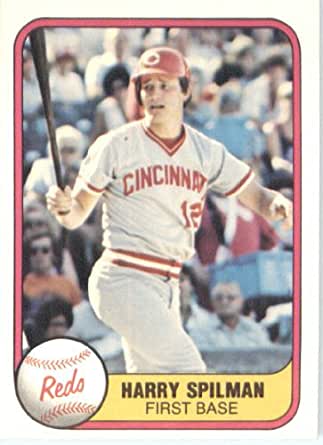 first-basemen.
first-basemen.
JH And eventually traded Revering to Oakland –
L So they could bring Harry up.
JH But you went to AA. It looks like you were a starter there.
L No.
JH No? 127 games; 404 plate appearances?
L I didn’t start; I was there to back up. Their first-round pick was Brad Kessler, who had screwed up his arm. So they were trying to see — and they thought he had potential hitting-wise. So they put him at first base to start the season, and I’m there to back up. But he didn’t hit, and he wasn’t playing all that well at first base because he’s not a first-baseman. So probably within the first month, they released him, and then I took over. And I did come in and pinch-hit.
But just starting the season at Three Rivers, I had some really cold weather. So I’m sitting in the dugout with things — we had hibachis in the dugout to keep our hands warm. And they’re going: Lucich! Pinch-hit!
I’m going, shit, I can’t even feel the bat, my hands are so cold. How am I gonna – “ [laughs]
JH Take one on the thumbs, and I bet you’d feel that for a week! Zzzzzzzzzzzzzzzzzt!
L Here’s the other thing that — okay, so I’m going, I could never find my groove. Not playing; can’t find my groove. So Lynn Jones and I go out to the ballpark early, and we’re doing toss drill. So they come: I can’t do that. You’re ruining the fence.
How — what am I supposed to do to get better? There was no coaching. Roy Majtyka was the coach, and all he wanted to do was — unlike Greg, Greg was pretty straight-laced other than just a real prankster. Majtyka said, I don’t want you drinking in the same bar that I am, so when we’re on the road, I will be drinking at the bar at the hotel. I don’t want to see any of you guys. And you kind of go, okay. So there’s a certain element.
Mark hit .245/3/32 in AA for the 1976 season, and in 1977 he found himself back in A-ball at Tampa.
JH The notion that I remember in those days, was that AA was kind of the tipping point between prospects and suspects. You’ve explained what happened in AA, and you hit .245 and you sort of survived the season, it sounds like? But then you’re back in A ball in 1977. What happened? I mean, did the organization turn its back on you, or was there an injury?
L No, I just had a bad year.
JH You said he couldn’t find your groove, which I understand, given the circumstances. And you just couldn’t get out from under it?
L No. It’s like I’m playing with — I played with Scotty Brown. [He] never went to college. He had trouble finding home plate! I mean, he couldn’t even come close sometimes. I’m playing against these young kids. I stole second base several times. How many stolen bases does it show I had?
JH 12.
L Yeah. Okay. I have no speed. But as a first-baseman, I know how pitchers do, and you can tell these kids had no notion. They would get into a routine. As soon as they move, then take off to second base. I’d be standing on second base by the time the catcher got the ball, their moves were that bad.
JH So you were going on first move?
L I was going on first move because I’ve watched him a little bit and I’m going, he’s not paying attention! These [guys] are too young — here’s — mentally, there was no challenge. And again, you’ve got — the coach at single-A was a jerk.
So there’s a rule that you had to be in bed by a certain time. So he comes by my apartment and my roommate was there and he said, well, Luke’s in bed with his girlfriend, who came out from California. Well, he fined me 25 bucks, and I’m making — at that point I’m making a whopping $750 a month.
So my salaries were $300 the first year, $500 the second year, $700 in AA. And they bumped me up $50 in single-A.
And actually it was in single-A that I said, I’m as fast as some of these guys.
JH Could you run the bases? That’s the thing.
L I can run the bases. I have all the mechanics. I didn’t — I don’t have natural speed. I’m reasonable. But at this level, I’ve come to appreciate — they’re not looking at — they’re wanting to know, can I see you in the major leagues right now? Beyond that, they don’t seem to care.
JH Yeah, because after 1976, they send you back to single-A, and it’s like, somebody has passed judgment on you that you’re not a prospect anymore. You’re a body taking up –
L Space.
JH — taking up a roster spot. What happens after 1977? Do they release you? Do you say you had enough? What happened?
L So I’m waiting for them, to hear from them. Are they releasing me? What’s happening? So at the end of January, they say — I forget if it was a phone call or a letter — they say, we couldn’t find a place for you, so we’re releasing you. I’m going, yeah. Well, spring training’s just about ready to start. I have no chance –
JH To hook on with somebody else.
L — to hook on with anybody else. My parents called me later in February, through some connections all the way in Eureka. Somebody up there had heard about a tryout in Arizona. I’m living in the Bay Area at the time, so I hear about it Thursday. So hell, I make arrangements.
I fly down to Arizona on Friday. I get in, I room with a guy that I played ball with in Alaska: Gary Wheelock. I just crashed on his couch for the night. I go out to the ballpark on Saturday and they said, well, we’ve already been practicing two days, and we’re dividing into teams. Come back tomorrow, Sunday, and we’ll fit you in then.
And Sunday, it rained. I never even got a chance to put my cleats on.
I said, okay, the reality is, I’m done.
I’m now married to the same woman the coach fined me for being asleep with [laughs].
JH Well, you got something out of pro ball, anyway! [laughter]
L Well, I’m divorced from her. By 1980 I got divorced from her.
Mark sees Greg Riddoch’s approach as a key to the 1975 Ems’ success, and he’s realistic about his abilities as a player.

L Greg’s story, and probably the 1975 team, is a good one. This is the only club I’ve been involved with where we’ve had reunions.
JH Forty years on, and you guys are still coming back and getting together! And the overriding thing is that, and that when you played, the whole “every man for himself” kind of thing that happens so often in minors and independent ball, that didn’t happen apparently with this team; that it really was a team and not just a collection of guys who are trying to get ahead.
L Well, I’d say partly, Riddoch was probably the core of making that happen, because of his personality.
[The 1975 Emeralds] were older. For us, it was all about being able to play ball. So there was a core there with Greg’s personality and his ability to teach and that stuff that really, I think, meshed in an unusual way.
JH Any regrets about how it all went down? do you feel like you were a victim of circumstance more than talent, or —
L I would say I can look back and see that I really didn’t have the talent that they were looking for, I don’t think.
We came up at a time where, I can remember there was no weight-training. Everything was old-school, so your title there [The Haught Corner: Old-school Baseball] is exactly right. And I remember spring training in 1975 was the first year they had the Nautilus equipment, and most of the people, older-timers, they were scoffing at it.
JH Bind you up, and all that.
L Yeah, exactly. Because they didn’t know how to weight-train properly then. You look at all these players now, it’s nothing but a power game. Guys are heavy [into] weight-training, if not other things. So –
JH But you had a year in 1975, where you hit 12 home runs in 70 games. I mean, it’s not –
L I’m big and strong. It’s a summer league. I’m okay, but — in 1972, I played with Dave Winfield; in 1976, André Dawson was in Quebec City.
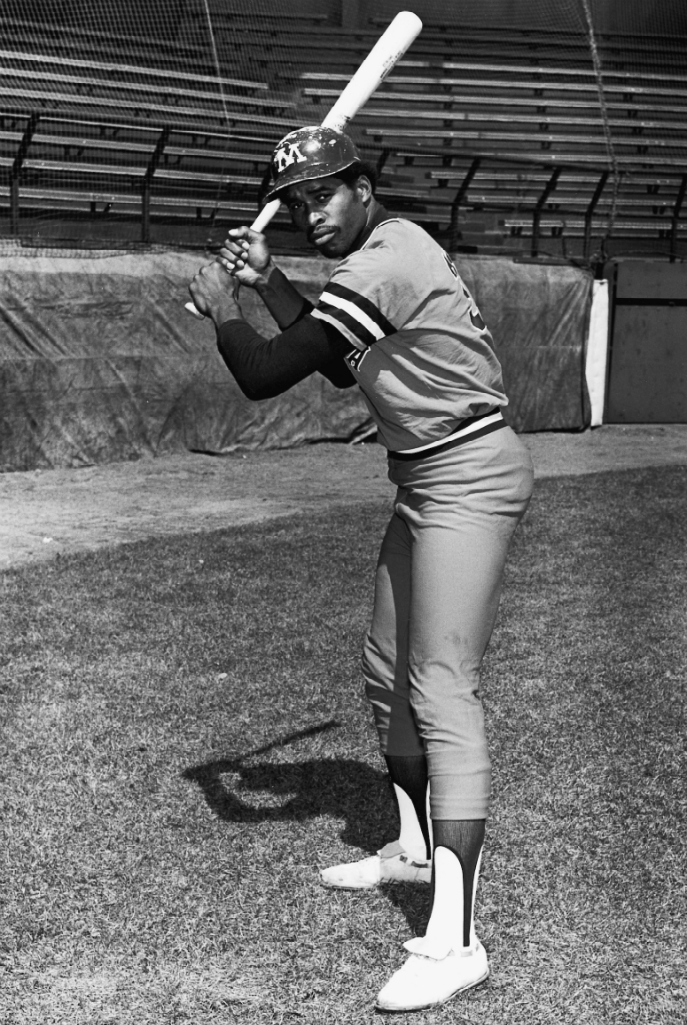
JH Oh, man!
L These guys — Winfield, Dawson, you’re seeing studs — and what they’re looking for in the majors now, that’s all they’re looking for.
I see what Greg is doing with coaching [hitters] now. There was nothing like that; this whole notion of how to hit.
JH You never got the kind of teaching then that Greg is giving now; you see the difference. How critical was his role to that 1975 team, and all those guys being so successful? What was special about what he did, and how he conveyed what he wanted done?
L He’s very good at reading people. And what I think he did is, he would do things to keep people relaxed. He was reasonable, but not really tough, like my Babe Ruth –
JH The ex-Marine was.
L — the ex-Marine was. And he got better himself over the years, as well.
But I think Greg cares about people in a way that’s unusual. And just kept the team loose, but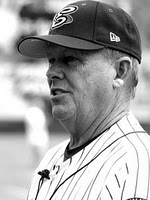 focused. And there was enough of us that, a lot of us focus on the game and play. We’re happy.
focused. And there was enough of us that, a lot of us focus on the game and play. We’re happy.
I would say Greg shined, and that 1975 team shined, because everybody was working. He was interested in the players. Players were interested in playing, and you just work together.
And it’s just one of those mixes of older guys and new guys that were — because Paul [Moskau] was a college player; Lynn Jones was a college player. So we had some maturity, enough to keep everybody in line and just the focus on the winning and just playing good ball. Really, I’ve never thought of it as that hard. [laughs]
JH There sure are plenty of times when it doesn’t seem to work, though. Or that an organization gets so bent on winning that they lose track of player development, which — okay, which are we supposed to be doing here? Or they can’t project talent. They draft high-school kids and they never amount to anything, or they won’t give a 24-year-old a better look, because they say, well, he’s already played college ball. Some organizations never seem to get it through their heads and others seem to just produce just bucketloads of players.
Like you said with the Reds: they got Pérez at first base, here comes Driessen, and here comes Revering. They just keep sending them along, and you’re not going to be able to use them all, but maybe you can get some pitching help.
L Oh, exactly. You know?
JH Don’t hold the guy back just because there’s somebody blocking him, if he’s a good player.
L Well, partly what you’re supposed to be doing is, you’re supposed to be scouting other teams you’re playing against, as well.
JH Right.
L And you trade a AAA player for someone that’s a prospect and wherever — a pitching prospect, well, you might end up better. It’s like, there’s too much of a buddy system in the pro-ball ranks, and it’s like — or you get an owner like Marge Schott who could destroy your organization.
So it’s like, honestly, I don’t watch much pro baseball. I’ll watch the playoffs, because you know, they finally get away from — now it’s who wins the three games first. Now they’re focused on winning. Because I got to win now.
Well, that’s what we were doing the whole season in 1975. That’s the way we played the whole season. That’s why we were good.
JH Imagine that!
L That’s like, why is that such a hard thing? And because I’m in Canada now, I get a lot of the Toronto games. It was the only baseball I get to see; the first 10 years up there they’re without a lot of the unusual channels. Or there’s no cable where I live. I literally couldn’t find baseball games, and it wasn’t on line like it is now, either. So I lost track from 2000 to 2010, but it’s coming back — especially with, at least with the Blue Jays, it’s like this is all about show. All about power. That’s it. And although the Blue Jays are bringing up a lot of young kids – surprise, surprise! They’re playing pretty well. Give these guys a chance.
JH Yeah. Imagine what might happen.
Excerpted from my book The Little Red Wagon: The 1975 Eugene Emeralds
